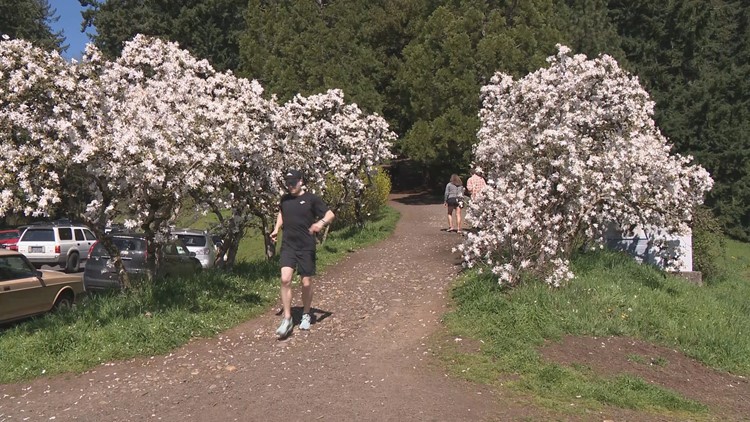PORTLAND, Ore. — Runny nose, sneezing, and red and watery eyes. Allergy season is in full force and the Portland metro area has been seeing a high pollen count.
"Certainly as people start sneezing, they start giving us a call, and we have seen our calls go up in the last month or so," said Kendra Killian, a nurse manager at Allergy Clinic in Portland.
She said pollen allergy season has been starting earlier than normal. When winters are milder, trees start to "wake up" sooner in the spring and pollinate.
This past winter, however, was unusual because Portland saw a warmer-than-normal December, followed by January's winter storms and freezing temperatures.
"We had started seeing a little bit of pollen and then the freeze happened and we had kind of a pause in the pollen," Killian said. "I think we have, over the last decade or so, seen our pollen season start a little bit earlier than it had in decades past."
Common allergenic pollens in Oregon
If you have been miserable this spring, tree and grass pollen are the likely culprits. Tree pollen season starts to ramp up around February and March, depending on how the winter went, Killian said.
"The trees are really out in force, and those will probably remain high, though fluctuating somewhat with rains and such," Killian said. "Then as they’re tapering down, the grass is starting and that’s another big allergen."
Killian said tree allergenic pollens she has seen in the clinic most often recently include birch, alder, cottonwood and cedar.
"There are a lot of things like people can see, like the cherry trees, and their symptoms happen when the cherry blossoms are blooming," she said. "But cherry blossoms are actually pollinated by insects, so it’s usually the flowers that you can’t see, unless you really get up close and personal with the tree, that are the ones causing your symptoms."
Grass pollen season historically spans from May to July, followed by weeds, Killian said, though fewer people find weed pollen to be problematic.
How to reduce pollen allergy symptoms
There are many over-the-counter options that are effective and can be used together, including oral antihistamines, antihistamine eye drops and nasal steroid sprays.
"Just in the last year, a nasal antihistamine spray has become available over the counter, and that can be used alongside the nasal steroid sprays," Killian said.
She also pointed to a safety measure from the pandemic: face masks.
"I know we are all so tired of masks, but I just hear a lot of patients report that if they wear their masks outside when it’s peak pollen season, it does help them because they're breathing in less of the pollens," Killian said.



